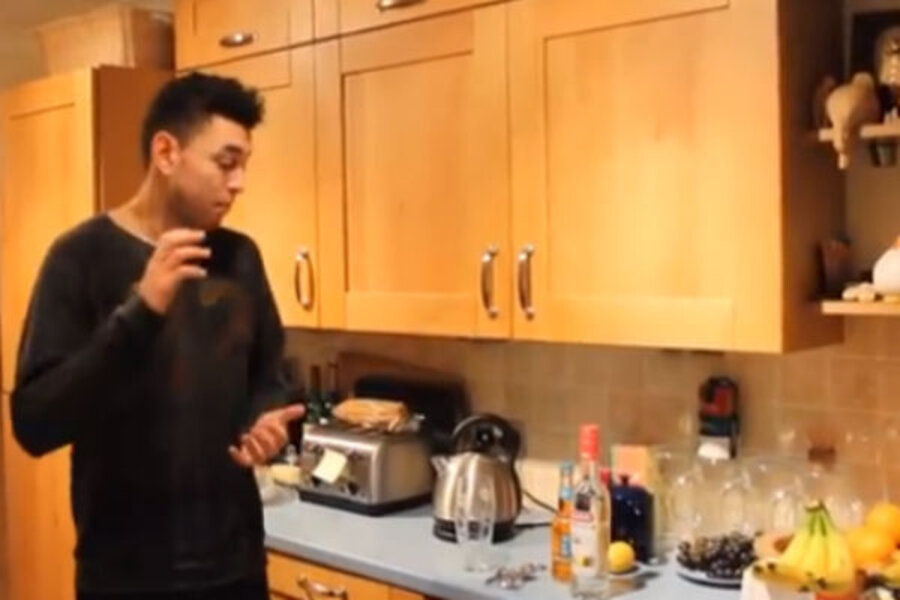Stopping the 'neknominate' drinking game
Loading...
Just as about every other human (and other animal) behavior has turned up in social media, so has “neknomination” (or “neck nomination,” “neck and nominate,” etc.). It keeps evolving, but it’s now a blend of a dare game (e.g., “Truth or Dare” or “Top This”) and drinking game that’s thought to have started in Australia.
It began getting mainstream media coverage across the Atlantic this month after neknomination was connected to some deaths of young adults – including one in Northern Ireland, the BBC reported.
Jonny Byrne, the 19-year-old who died in Northern Ireland, jumped off a bridge after “necking” (speed-drinking). Gawker has other examples of how bad the “game” has gotten – to the point where a self-destructive need for “fame” seems to be an element.
Daring and shaming can be bullying
That’s where the latest version uses social media – taking video of oneself doing the drinking, then “nominating” three peers to top that by “tagging” or naming them on a neknomination page. But this is not new. Researchers showed the Berkman Center task force of 2008 how people of all ages (usually younger ones) would dare each other to view the most disgusting possible videos and do crazy stunts in video-sharing sites to grow their followings. Neknomination is another form of both daring and attention seeking, but the “top this” element has made it dangerous.
Then there’s the bullying element. Certainly, speed drinking has long been a part of hazing, and there is always an element of peer pressure, but Mr. Byrne’s brother, who had tried to rescue him, told the BBC that neknomination is sometimes a form of bullying. He said that a friend of Byrne’s who’d been neknominated the previous week and ignored the nomination had been harassed and bullied for being a “chicken.”
RAKnomination: Spreading random acts of kindness
Neknomination has got to stop. The thing is, users themselves are taking action. For every type of negative (or destructive) use of social media, there seems to be a positive one.
Shortly after Byrne’s death, #RAKnomination started trending on Twitter and Facebook, encouraging people to nominate others to commit random acts of kindness, or RAKs, TheJournal.ie reported. Another positive countermeasure is “nekdonations.” A man in South Africa posted a video that inspired a man in Northern Ireland to nekdonate – donate 5 euros, “the price of a pint of beer” – to Temple Street Children’s Hospital and nominate others to do something similar.
As for Brent Lindeque, the South African man, he was neknominated by someone, so he videotaped himself giving a sandwich, drink, and chocolate bar to a homeless man and nominated three more people to commit kind acts themselves. “Underneath his video, which has amassed nearly 100,000 views [now 300,000+],” reported Metro.co.uk, “he writes: ‘I’ve decided to create something positive out of the random global phenomenon of NekNominations... Imagine if we all harnessed the power of social media to make a real difference in peoples lives. #OnlyGoodThings’.”
How to un-nominate yourself
If somebody you or your kids know gets “nominated” on Facebook, it means they’ve been tagged by the nominator, and they can untag – in effect, un-nominate – themselves (in addition to not taking the bait, not encouraging the stupidity and not doing something stupid).
Most Facebook users already know how to untag themselves, but just in case they don't, here‘s how. They can also block the nominator if they are getting really annoying, so the person can’t tag or message them or appear on their timeline, or they can click on “Activity Log” on their timeline page and delete the post from their timeline.
One other really good idea (for preventing annoying posts) is to turn on “Review posts friends tag you in before they appear on your timeline.” To do that, click on the teeny little gear icon in the upper-right corner of your Facebook home page or timeline, then on “Settings.”
Then, in the left-hand column of your Settings page, click on “Timeline and Tagging,” which will take you to where you can pre-approve posts and tags. You’ll also be able to control “who can add things to [your] timeline,” “who can see things on [your] timeline” and more – really good things to be able to control.








